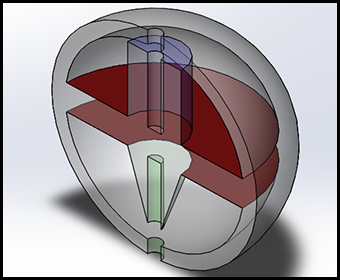
This concept image of the Multistage Polymer Delivery System illustrates a 3-D printed, biodegradable device that allows for a personalized medicine approach to treating a variety of illnesses. Implanted for localized delivery, the device uses specialized geometric shapes to control drug release and dissolves after treatment.
(Aug. 7, 2018) -- Researchers at The University of Texas at San Antonio (UTSA) and Southwest Research Institute (SwRI) are developing a 3D printed implant that, when injected in a patient’s body, could deliver a personalized dose of medicine to treat infections and ailments such as arthritis, cancer and AIDS. The project, led by Lyle Hood in the UTSA College of Engineering and Albert Zwiener in SwRI’s Chemistry and Chemical Engineering Division, is supported by a $125,000 grant from the organizations’ Connecting through Research Partnerships (Connect) program.
For a drug to be effective, patients must take a minimum amount, but not so much that it makes them ill or causes serious harm. Subsequently, someone who needs frequent and precise doses of a specific medicine either has to take a pill each day or visit a doctor for treatment. To remedy this, the San Antonio researchers are developing an implantable device that can deliver a controlled, personalized dose of medicine over several weeks.
“The implant addresses a specific patient’s illness in addition to their medical history and other health issues,” Zwiener said. “We inject this non-invasive device into the body to deliver medicine over a significant period of time.”
The design, which Zwiener and Hood created with UTSA graduate research assistant Priya Jain, incorporates complex geometries to personalize each device to an individual’s ailment and takes advantage of the selective timing and release of the compound. The team will create the device with a specialized 3D printer at UTSA that can print biodegradable materials. This makes removal of the implant unnecessary; it will simply dissolve inside the body when the treatment is complete.
The implant is also engineered to trigger localized immunotherapy for cancer treatments. Immunotherapy enlists the body to attack cancerous tumors. The UTSA-SwRI team believes that the device’s localized treatment capabilities can trigger the body to destroy the invasive cancer.
“If clinically translated, this would allow for doctors and pharmacists to print specific dosages to meet patient’s needs,” Hood said. “In immunotherapy, most strategies employ systemic circulation through an IV line, much like chemotherapy. This can cause issues with immune reactions far away from the intended target. We hope that by delivering locally, we can keep acute effects constrained to the diseased region.”
While the implant is ideal for cancer treatment, it’s designed to be drug agnostic, meaning that it can work with any type of drug and could have a significant impact on a wide array of diseases and ailments.
The Connecting through Research Partnerships (Connect) Program, sponsored by the UTSA Office of the Vice President for Research, Economic Development and Knowledge Enterprise (VPREDKE) and the SwRI Executive Office, is a grant opportunity offered to enhance greater scientific collaboration between the two institutions and to increase both UTSA’s and SwRI’s research-funding base with cross-campus collaborative programs.
Learn more about the UTSA Department of Mechanical Engineering.
Learn more about the UTSA-SwRI Connect program.
Connect with UTSA online at Facebook, Twitter, YouTube, Instagram and LinkedIn.
UTSA Today is produced by University Communications and Marketing, the official news source of The University of Texas at San Antonio. Send your feedback to news@utsa.edu. Keep up-to-date on UTSA news by visiting UTSA Today. Connect with UTSA online at Facebook, Twitter, Youtube and Instagram.
Huddle Against Hunger is a fundraising competition with Texas State that benefits our Roadrunner Pantry. Donations this week will help UTSA earn additional prize monies provided by RBFCU.
In-Person and VirtualJoin UTSA Libraries for an update on federal public access policies and how the library can assist with compliance.
Virtual EventWe invite you to join us for Birds Up! Downtown, an exciting welcome back event designed to connect students with the different departments at the Downtown Campus. Students will have the opportunity to learn about some of the departments on campus, gain access to different resources, and collect some giveaways!
Bill Miller PlazaThere are many citation managers. Which one is right for you? This workshop will explain what a citation manager is and how it can help you organize your citations, insert citations as you write your paper, and generate your bibliography.
Virtual EventPubMed is an essential database for anyone conducting biomedical or health-related research. This workshop will teach attendees how to effectively navigate this free resource and locate peer-reviewed articles using advanced search features, MeSH subject headings, and Boolean operators.
Virtual EventIn this hands-on workshop, participants will learn to setup an EndNote library, save references and PDFs, and automatically create and edit a bibliography. Attendees are encouraged, but not required, to have EndNote already installed on a personal computer.
Virtual EventJoin UTSA Libraries and Museums to learn more about the publishing discounts available for UTSA researchers. Current agreements include Elsevier, Cambridge University Press, Wiley, and more. Bring your questions and feedback for the library as we continue to pursue partnerships with publishers to reduce costs for our researchers.
Virtual EventThe University of Texas at San Antonio is dedicated to the advancement of knowledge through research and discovery, teaching and learning, community engagement and public service. As an institution of access and excellence, UTSA embraces multicultural traditions and serves as a center for intellectual and creative resources as well as a catalyst for socioeconomic development and the commercialization of intellectual property - for Texas, the nation and the world.
To be a premier public research university, providing access to educational excellence and preparing citizen leaders for the global environment.
We encourage an environment of dialogue and discovery, where integrity, excellence, respect, collaboration and innovation are fostered.